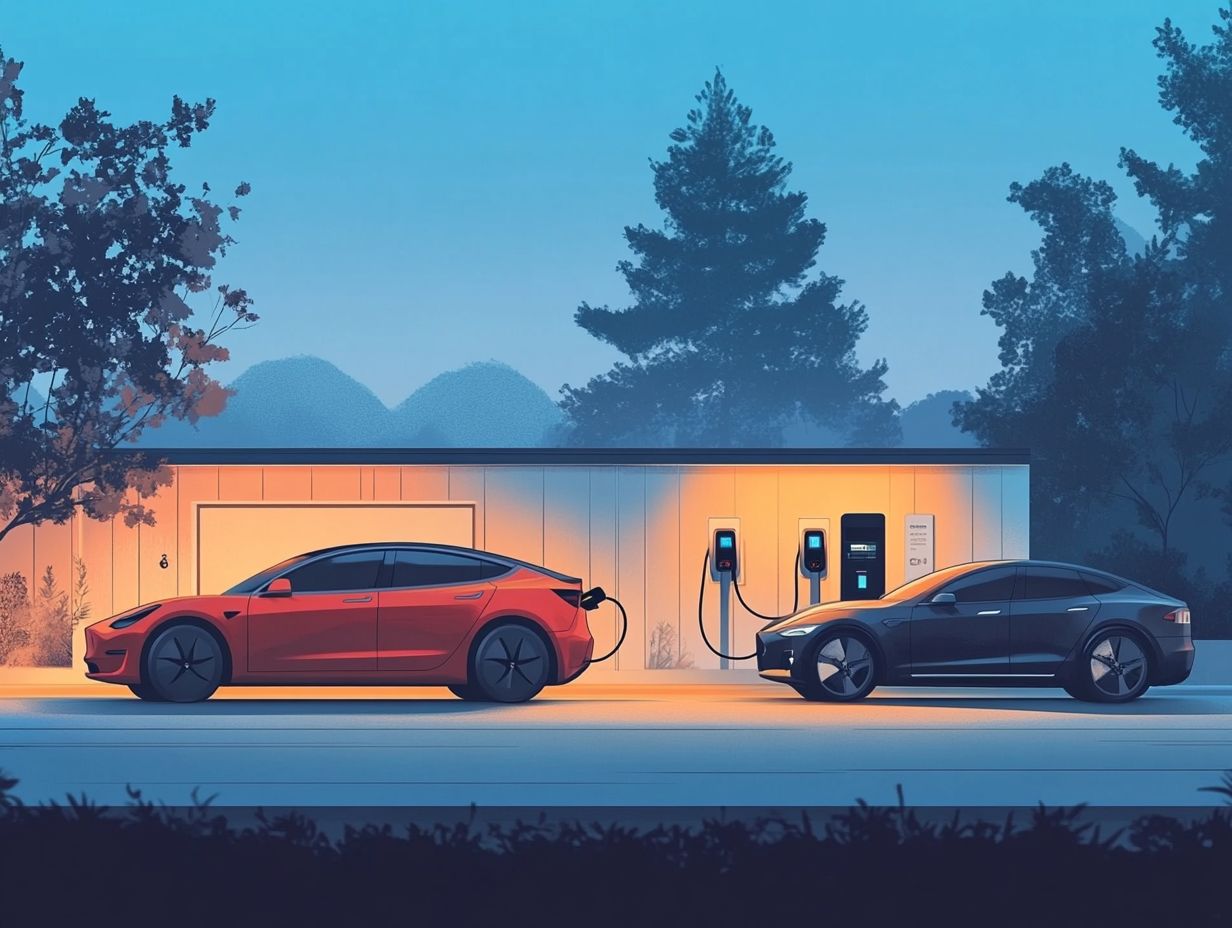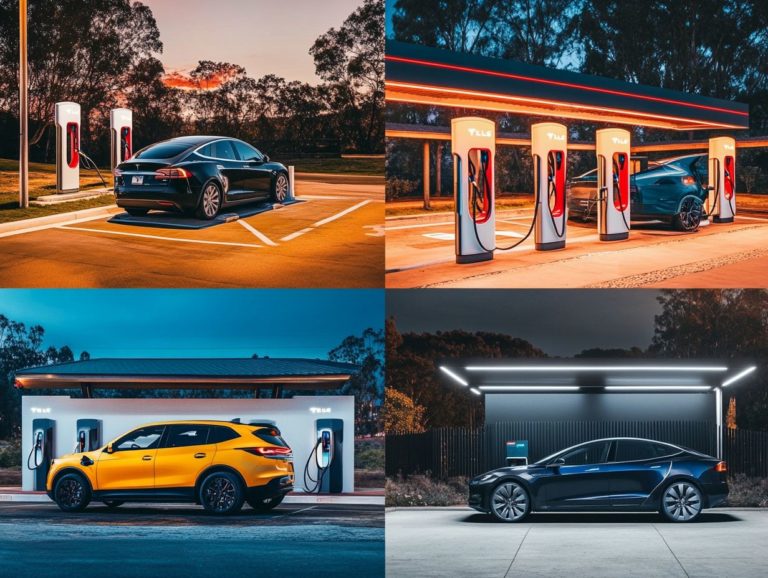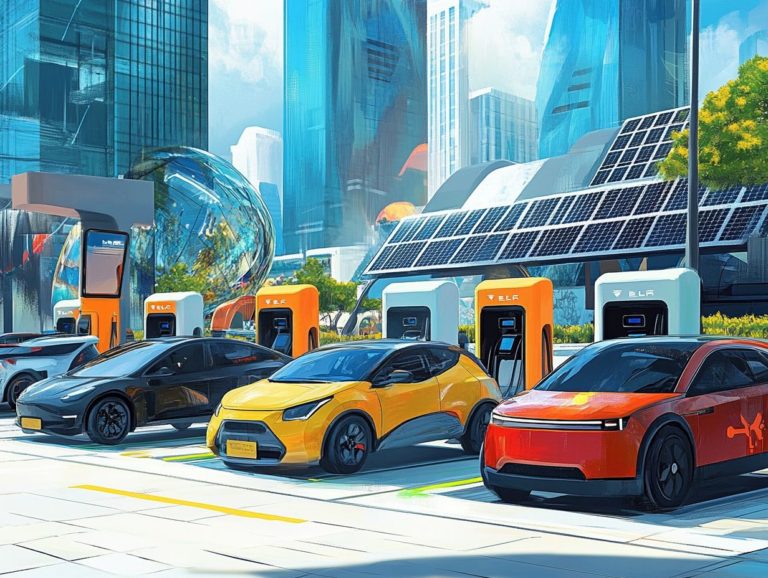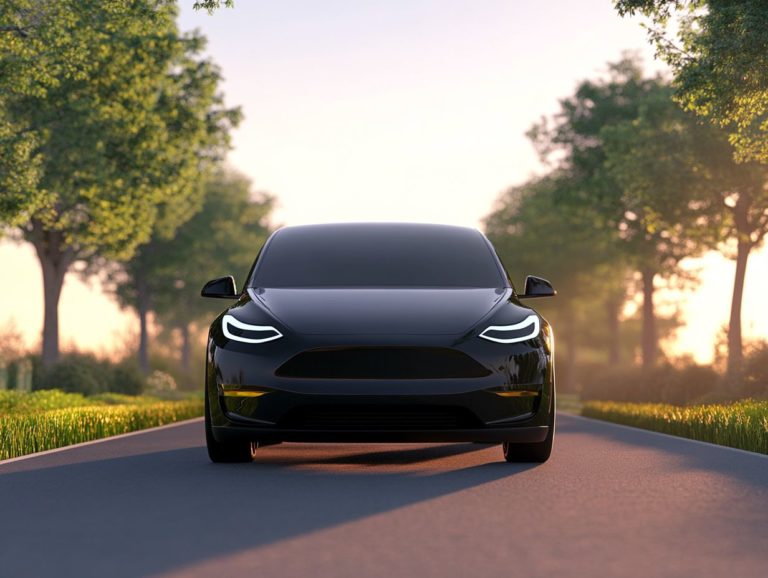Electric Vehicle Myths: What You Need to Understand
Electric vehicles (EVs) are swiftly becoming the future of transportation, but misconceptions still obscure their true advantages. This article sets the record straight on common myths, including the notion that EVs are prohibitively expensive or have a limited range.
It delves into their environmental benefits and the financial savings they can provide, revealing the broader picture. You re about to discover the hurdles to widespread adoption, such as infrastructure challenges and the critical need for education.
By the end of this exploration, don’t miss out on understanding why electric vehicles represent a compelling choice for the future.
Contents
Key Takeaways:
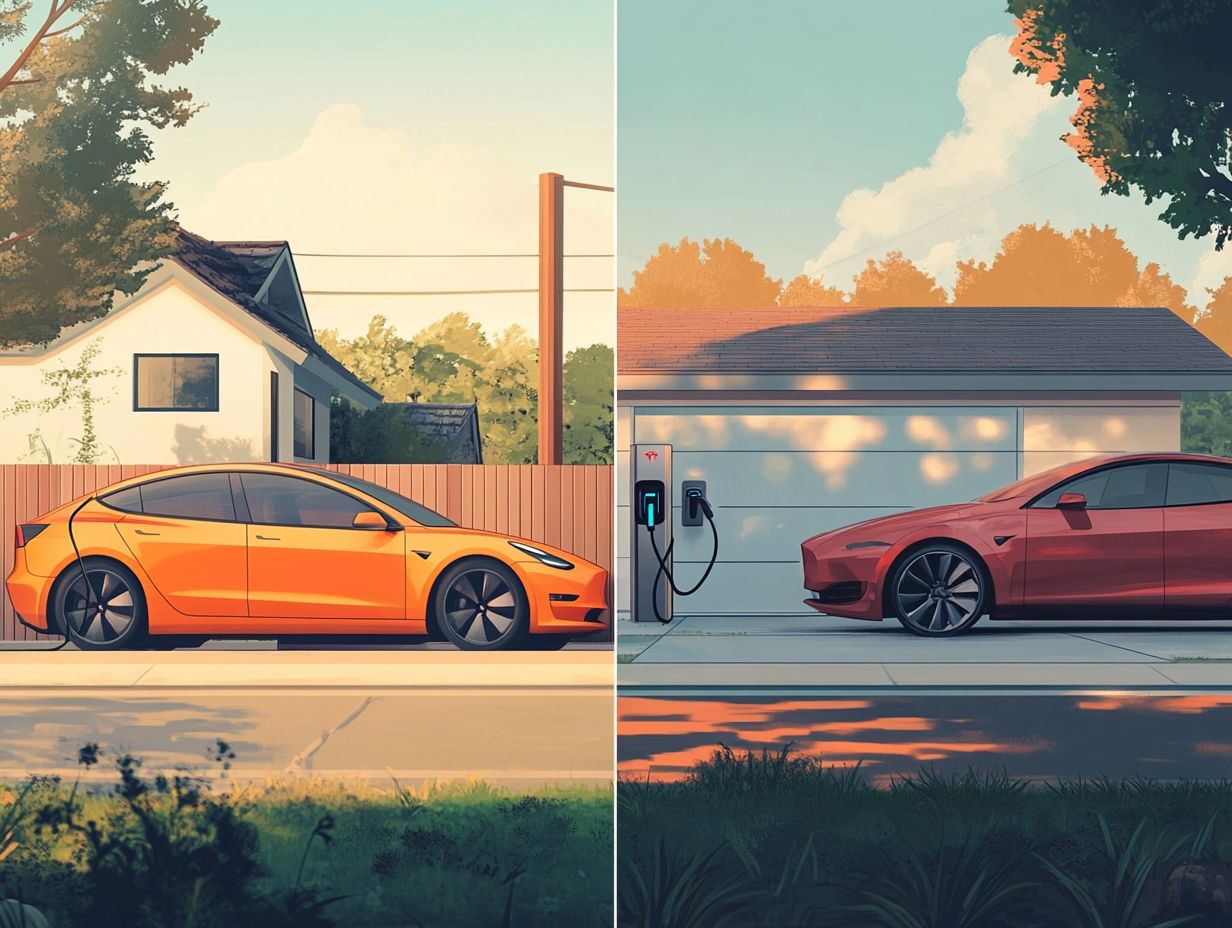
- Electric vehicles can be as affordable as traditional gas-powered cars when you factor in total ownership costs.
- Electric vehicles typically have a range of 200-300 miles enough for most daily driving needs.
- Electric vehicles produce zero emissions, making them a cleaner choice for our environment.
Defining Electric Vehicles
Electric vehicles (EVs) represent a big change in the automotive world, designed to reduce greenhouse gas emissions and address the pressing climate challenges posed by gasoline-powered cars. As you navigate the realities of climate change, EVs present a sustainable alternative, boasting lower carbon footprints thanks to their reliance on renewable energy sources and efficient battery technology.
This innovation is not just a passing trend; it is an important development in our transportation systems, with far-reaching implications for the power grid and the future of mobility.
The importance of electric vehicles goes beyond merely cutting emissions; they inspire a reimagining of urban landscapes and energy consumption patterns. Unlike traditional gasoline vehicles, which release harmful pollutants and greenhouse gases, EVs produce zero tailpipe emissions, significantly enhancing air quality in densely populated areas.
Advancements in battery technology are making energy storage more efficient, allowing these vehicles to harness more renewable energy sources like solar and wind.
As charging infrastructure advances, it becomes increasingly accessible, further encouraging the adoption of EVs and paving the way for a sustainable future where clean energy and transportation thrive in harmony.
Debunking Common Myths
Despite the rising popularity of electric vehicles, numerous myths still confuse many people, impeding their widespread adoption. These misconceptions often center on costs, performance, and environmental impact, which can leave you questioning whether it’s truly feasible to transition from traditional gasoline cars to EVs.
As you explore these myths further, it becomes clear that grasping the realities of EV ownership costs, charging requirements, and emissions standards is essential for making informed decisions.
Myth #1: Electric Vehicles are More Expensive
One of the most common misconceptions you might encounter is the belief that electric vehicles (EVs) are inherently pricier than their gasoline counterparts, which may stop you from looking into the advantages. While it s true that the initial purchase price of some EVs can be higher, the total cost of ownership factoring in savings on fuel, lower maintenance costs, and enticing tax incentives often reveals that EVs are a more economical choice in the long run.
In fact, many EV owners discover that their charging expenses are significantly lower than the cost of gasoline, especially when they take advantage of home chargers during off-peak hours. With fewer moving parts, electric vehicles also require less maintenance, leading to reduced costs over time.
Regarding charging times, advancements in fast-charging technologies have made it increasingly convenient to recharge while you re on the go. So, although the upfront costs may initially appear daunting, the long-term economic benefits and potential savings position electric vehicles as an appealing option for those of you who are budget-conscious.
Myth #2: Electric Vehicles Have Limited Range

Another common myth you may encounter is that electric vehicles have a limited range. This can make you question their practicality for everyday use. While early models did struggle with range, advancements in battery technology have significantly enhanced the driving range of modern EVs. This makes them well-suited for a variety of driving conditions and longer trips.
Thanks to these improvements, you can travel further without the constant worry of needing to recharge. This effectively reduces worries about running out of charge. The expansion of charging infrastructure has also played a crucial role in improving convenience. With more charging stations popping up in urban areas and along highways, recharging your EV has become much easier.
This evolution in the electric vehicle landscape supports your daily commuting needs and encourages long-distance travel. It makes it easier for you to view EVs as a realistic and appealing alternative for your transportation needs.
Myth #3: Electric Vehicles are Not Environmentally Friendly
Contrary to what many might think, electric vehicles (EVs) can often be perceived as less environmentally friendly. This misconception is largely due to concerns about battery manufacturing and the energy sources that power them. However, when you examine their entire lifecycle from production to end-of-life you’ll find that EVs typically generate significantly lower greenhouse gas emissions compared to gasoline vehicles. This is especially true when charged with renewable energy technologies.
This reduction in carbon emissions is essential as the world confronts the realities of climate change. While the environmental impact of battery manufacturing is a valid concern, ongoing advancements in technology are constantly enhancing efficiency and sustainability in this sector. By sourcing electricity from low-carbon options like wind or solar energy, you can amplify the ecological benefits of EVs.
Switching to electric transportation cuts your reliance on fossil fuels today and sets a powerful example for others. It also paves a clearer path toward reducing overall carbon footprints, making a strong case for the wider adoption of electric vehicles.
Why Electric Vehicles are a Smart Choice
Imagine enjoying substantial financial savings while helping the planet! The advantages of electric vehicles go far beyond simple convenience; they present notable environmental benefits that are becoming increasingly hard to overlook.
With reduced fuel expenses, lower maintenance costs, and the potential for energy storage through the ability to send stored energy back to the grid, EVs make a persuasive argument for both consumers and businesses in the pursuit of sustainability.
Financial Savings and Environmental Impact
When you consider the financial advantages of owning an electric vehicle (EV), it s crucial to account for the costs related to charging infrastructure and the benefits of integrating renewable energy. You’ll be thrilled to find that maintenance expenses drop significantly! Transitioning to electric vehicles not only reduces your carbon footprint but also aligns with global initiatives aimed at slashing greenhouse gas emissions and fostering a cleaner environment.
The ongoing drop in electricity prices, coupled with a diminished reliance on gasoline, significantly contributes to your monthly savings. Electric vehicles have far fewer moving parts compared to traditional combustion engines, leading to fewer repairs and longer lifespans.
With the expansion of charging infrastructure including home charging stations and public sites convenience is greatly enhanced. When you power your EV with renewable sources like solar or wind energy, you not only lessen your dependence on fossil fuels but also elevate the overall economic and environmental benefits associated with electric vehicles.
Join the electric vehicle revolution today and be a part of the change for a cleaner future!
Overcoming Barriers to Electric Vehicle Adoption
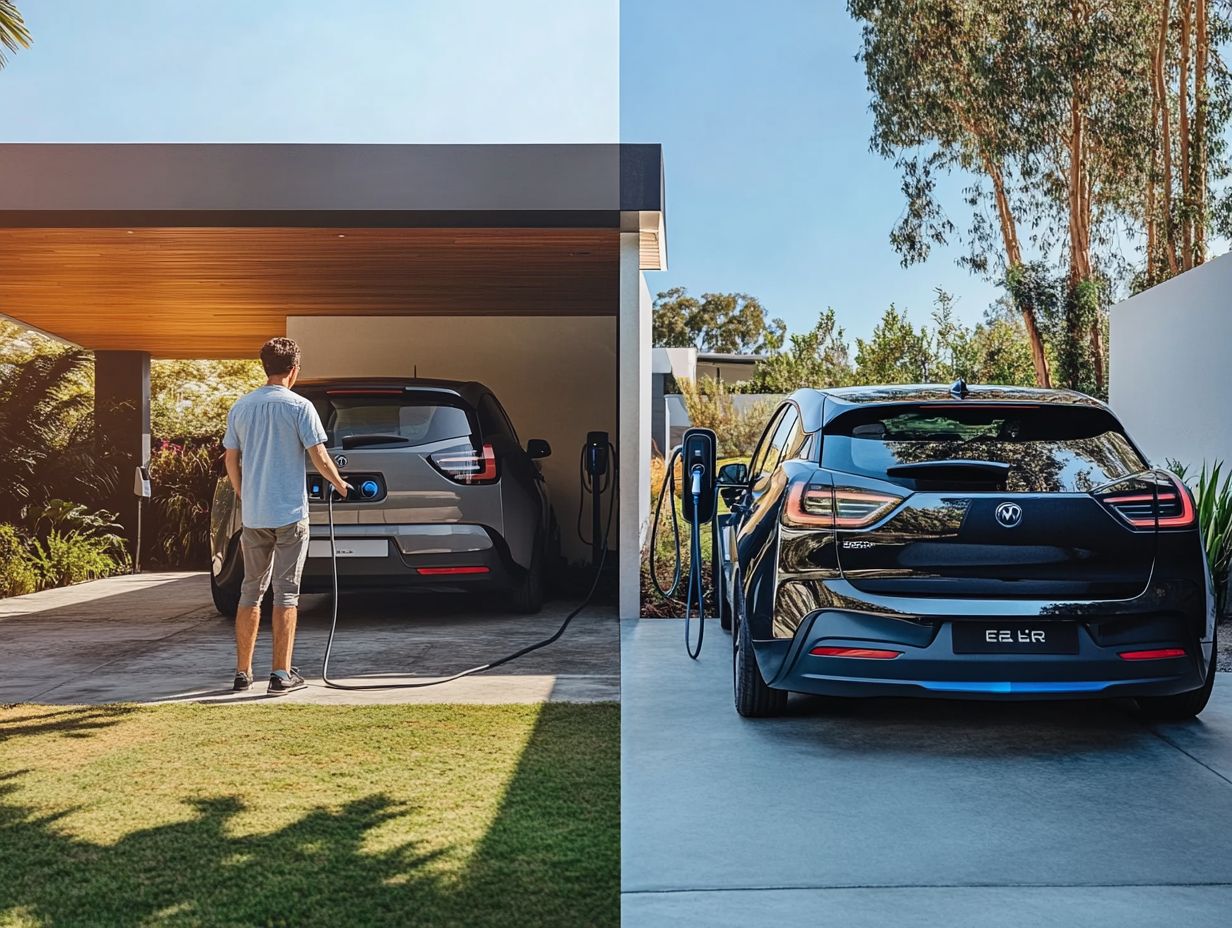
While electric vehicles offer numerous benefits, their widespread adoption encounters several hurdles. Inadequate charging infrastructure and educational gaps contribute to a lack of consumer confidence.
Tackling these challenges is essential for cultivating a thriving electric vehicle market. It’s crucial to ensure that prospective buyers are fully informed about the safety and reliability of EV technology.
Addressing Infrastructure and Education Challenges
To effectively tackle the challenges surrounding electric vehicle adoption, you must prioritize the development of well-developed charging stations. Enhancing public education regarding the benefits of EVs is also vital.
As electrification efforts expand, integrating electric vehicles into public transit systems becomes essential. This dual approach not only alleviates worries about running out of battery power for potential users but also highlights the convenience and practicality of EVs in everyday life.
By investing in conveniently located charging stations and ensuring they are accessible to everyone, communities can significantly boost residents’ confidence in transitioning to electric mobility.
When public transportation systems adopt electric vehicles, they exemplify sustainability in action. This attracts more users and fosters a culture of eco-consciousness. Such initiatives can change how people view electric vehicles, underscoring their vital role in reducing emissions and combating climate change ultimately creating a ripple effect that encourages broader adoption.
Frequently Asked Questions
-
What is an electric vehicle?
An electric vehicle is a type of vehicle that runs on electricity instead of gasoline or diesel. It is powered by an electric motor and uses a battery to store and provide energy for the motor to run.
-
Do electric vehicles have limited range?
This is a common myth. In reality, electric vehicles have come a long way in terms of range. Most modern electric vehicles can travel up to 200-300 miles on a single charge, making them suitable for daily commutes and longer trips.
-
Are electric vehicles expensive?
The upfront cost of an electric vehicle may be higher than a traditional gasoline car. However, when you factor in the long-term savings on fuel and maintenance, electric vehicles can actually be more cost-effective in the long run.
-
Do electric vehicles have slow acceleration?
On the contrary, electric vehicles can have instant torque and provide quick acceleration. This is because electric motors deliver power immediately, unlike gasoline engines that need to build up power.
-
Are there enough charging stations for electric vehicles?
There are currently over 20,000 public charging stations in the United States, and the number is growing rapidly. Many electric vehicle owners have charging stations installed at home for convenient charging.
-
Do electric vehicles catch fire more easily?
This is a common misconception. The truth is that electric vehicles have a lower risk of catching fire compared to gasoline cars. Electric vehicles have advanced safety features and undergo rigorous testing to ensure their safety.
Considering an electric vehicle as your next car can be a step towards a greener future. Learn more about the advantages of electric vehicles and join the movement today!

